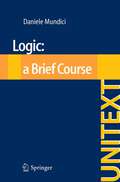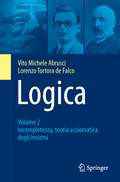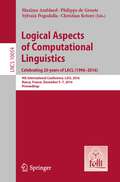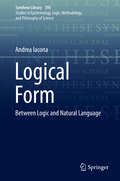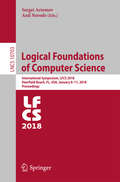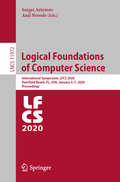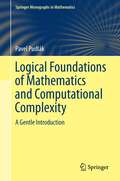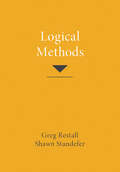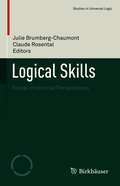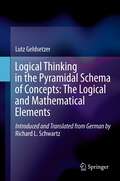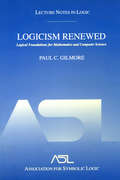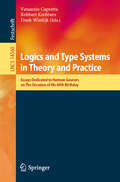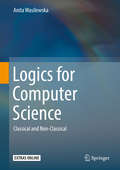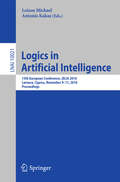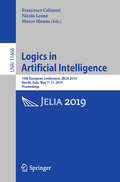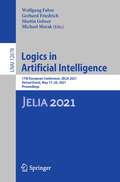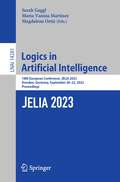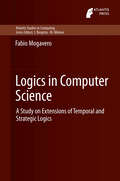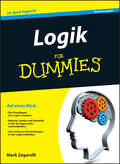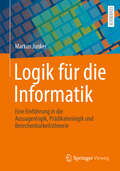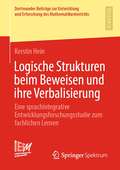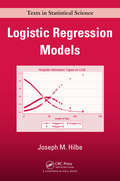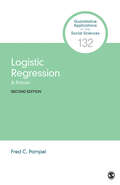- Table View
- List View
Logic: a Brief Course
by Daniele MundiciThis short book, geared towards undergraduate students of computer science and mathematics, is specifically designed for a first course in mathematical logic. A proof of Gödel's completeness theorem and its main consequences is given using Robinson's completeness theorem and Gödel's compactness theorem for propositional logic. The reader will familiarize himself with many basic ideas and artifacts of mathematical logic: a non-ambiguous syntax, logical equivalence and consequence relation, the Davis-Putnam procedure, Tarski semantics, Herbrand models, the axioms of identity, Skolem normal forms, nonstandard models and, interestingly enough, proofs and refutations viewed as graphic objects. The mathematical prerequisites are minimal: the book is accessible to anybody having some familiarity with proofs by induction. Many exercises on the relationship between natural language and formal proofs make the book also interesting to a wide range of students of philosophy and linguistics.
Logica: Volume 2 - Incompletezza, teoria assiomatica degli insiemi (UNITEXT #111)
by Vito Michele Abrusci Lorenzo Tortora de FalcoL'opera si propone come testo di riferimento per acquisire una solida preparazione specialistica nella Logica, presentando in maniera rigorosa ed innovativa argomenti tradizionalmente affrontati nei corsi universitari di secondo livello. Questo secondo volume, che completa l'opera, presenta le basi della teoria della ricorsività, l'aritmetica di Peano ed i teoremi di incompletezza, gli assiomi della teoria assiomatica degli insiemi di Zermelo-Fraenkel e la teoria degli ordinali e dei cardinali che ne deriva.
Logical Aspects of Computational Linguistics. Celebrating 20 Years of LACL: 9th International Conference, LACL 2016, Nancy, France, December 5-7, 2016, Proceedings (Lecture Notes in Computer Science #10054)
by Sylvain Pogodalla Maxime Amblard Christian Retoré Philippe De GrooteEdited under the auspices of the Association of Logic, Language andInformation (FoLLI), this book constitutes the refereed proceedings ofthe 20th anniversary of the International Conference on LogicalAspects of Computational Linguistics, LACL 2016, held in LORIA Nancy,France, in December 2016. The 19 contributed papers, presentedtogether with 4 invited papers and 6 abstracts, were carefullyreviewed and selected from 38 submissions. The focus of the conferenceis the use of type theoretic, proof theoretic, and model theoreticmethods for describing and formalising natural language syntax,semantics, and pragmatics as well as the implementation of thecorresponding tools.
Logical Form: Between Logic and Natural Language (Synthese Library #393)
by Andrea IaconaLogical form has always been a prime concern for philosophers belonging to the analytic tradition. For at least one century, the study of logical form has been widely adopted as a method of investigation, relying on its capacity to reveal the structure of thoughts or the constitution of facts. This book focuses on the very idea of logical form, which is directly relevant to any principled reflection on that method. Its central thesis is that there is no such thing as a correct answer to the question of what is logical form: two significantly different notions of logical form are needed to fulfill two major theoretical roles that pertain respectively to logic and to semantics. This thesis has a negative and a positive side. The negative side is that a deeply rooted presumption about logical form turns out to be overly optimistic: there is no unique notion of logical form that can play both roles. The positive side is that the distinction between two notions of logical form, once properly spelled out, sheds light on some fundamental issues concerning the relation between logic and language.
Logical Foundations of Computer Science
by Sergei Artemov Anil NerodeThis book constitutes the refereed proceedings of the International Symposium on Logical Foundations of Computer Science, LFCS 2007, held in New York, NY, USA in June 2007. The volume presents 36 revised refereed papers that address all current aspects of logic in computer science.
Logical Foundations of Computer Science: International Symposium, LFCS 2020, Deerfield Beach, FL, USA, January 4–7, 2020, Proceedings (Lecture Notes in Computer Science #11972)
by Sergei Artemov Anil NerodeThis book constitutes the refereed proceedings of the International Symposium on Logical Foundations of Computer Science, LFCS 2020, held in Deerfield Beach, FL, USA, in January 2020. The 17 revised full papers were carefully reviewed and selected from 30 submissions. The scope of the Symposium is broad and includes constructive mathematics and type theory; homotopy type theory; logic, automata, and automatic structures; computability and randomness; logical foundations of programming; logical aspects of computational complexity; parameterized complexity; logic programming and constraints; automated deduction and interactive theorem proving; logical methods in protocol and program verification; logical methods in program specification and extraction; domain theory logics; logical foundations of database theory; equational logic and term rewriting; lambda and combinatory calculi; categorical logic and topological semantics; linear logic; epistemic and temporal logics; intelligent and multiple-agent system logics; logics of proof and justification; non-monotonic reasoning; logic in game theory and social software; logic of hybrid systems; distributed system logics; mathematical fuzzy logic; system design logics; other logics in computer science.
Logical Foundations of Mathematics and Computational Complexity
by Pavel PudlákThe two main themes of this book, logic and complexity, are both essential for understanding the main problems about the foundations of mathematics. Logical Foundations of Mathematics and Computational Complexity covers a broad spectrum of results in logic and set theory that are relevant to the foundations, as well as the results in computational complexity and the interdisciplinary area of proof complexity. The author presents his ideas on how these areas are connected, what are the most fundamental problems and how they should be approached. In particular, he argues that complexity is as important for foundations as are the more traditional concepts of computability and provability. Emphasis is on explaining the essence of concepts and the ideas of proofs, rather than presenting precise formal statements and full proofs. Each section starts with concepts and results easily explained, and gradually proceeds to more difficult ones. The notes after each section present some formal definitions, theorems and proofs. Logical Foundations of Mathematics and Computational Complexity is aimed at graduate students of all fields of mathematics who are interested in logic, complexity and foundations. It will also be of interest for both physicists and philosophers who are curious to learn the basics of logic and complexity theory.
Logical Methods
by Greg Restall Shawn StandeferAn accessible introduction to philosophical logic, suitable for undergraduate courses and above.Rigorous yet accessible, Logical Methods introduces logical tools used in philosophy—including proofs, models, modal logics, meta-theory, two-dimensional logics, and quantification—for philosophy students at the undergraduate level and above. The approach developed by Greg Restall and Shawn Standefer is distinct from other texts because it presents proof construction on equal footing with model building and emphasizes connections to other areas of philosophy as the tools are developed. Throughout, the material draws on a broad range of examples to show readers how to develop and master tools of proofs and models for propositional, modal, and predicate logic; to construct and analyze arguments and to find their structure; to build counterexamples; to understand the broad sweep of formal logic&’s development in the twentieth and twenty-first centuries; and to grasp key concepts used again and again in philosophy. This text is essential to philosophy curricula, regardless of specialization, and will also find wide use in mathematics and computer science programs. Features:An accessible introduction to proof theory for readers with no background in logicCovers proofs, models, modal logics, meta-theory, two-dimensional logics, quantification, and many other topicsProvides tools and techniques of particular interest to philosophers and philosophical logiciansFeatures short summaries of key concepts and skills at the end of each chapterOffers chapter-by-chapter exercises in two categories: basic, designed to reinforce important ideas; and challenge, designed to push students&’ understanding and developing skills in new directions
Logical Modalities from Aristotle to Carnap
by Max CresswellInterest in the metaphysics and logic of possible worlds goes back at least as far as Aristotle, but few books address the history of these important concepts. This volume offers new essays on the theories about the logical modalities (necessity and possibility) held by leading philosophers from Aristotle in ancient Greece to Rudolf Carnap in the twentieth century. The story begins with an illuminating discussion of Aristotle's views on the connection between logic and metaphysics, continues through the Stoic and mediaeval (including Arabic) traditions, and then moves to the early modern period with particular attention to Locke and Leibniz. The views of Kant, Peirce, C. I. Lewis and Carnap complete the volume. Many of the essays illuminate the connection between the historical figures studied, and recent or current work in the philosophy of modality. The result is a rich and wide-ranging picture of the history of the logical modalities.
Logical Skills: Social-Historical Perspectives (Studies in Universal Logic)
by Claude Rosental Julie Brumberg-ChaumontThis contributed volume explores the ways logical skills have been perceived over the course of history. The authors approach the topic from the lenses of philosophy, anthropology, sociology, and history to examine two opposing perceptions of logic: the first as an innate human ability and the second as a skill that can be learned and mastered. Chapters focus on the social and political dynamics of the use of logic throughout history, utilizing case studies and critical analyses.Specific topics covered include:the rise of logical skillsproblems concerning medieval notions of idiocy and rationalitydecolonizing natural logicnatural logic and the course of timeLogical Skills: Social-Historical Perspectives will appeal to undergraduate and graduate students, as well as researchers in the fields of history, sociology, philosophy, and logic. Psychology and colonial studies scholars will also find this volume to be of particular interest.
Logical Thinking in the Pyramidal Schema of Concepts: The Logical and Mathematical Elements
by Lutz Geldsetzer Richard L. SchwartzThis new volume on logic follows a recognizable format that deals in turn with the topics of mathematical logic, moving from concepts, via definitions and inferences, to theories and axioms. However, this fresh work offers a key innovation in its 'pyramidal' graph system for the logical formalization of all these items. The author has developed this new methodology on the basis of original research, traditional logical instruments such as Porphyrian trees, and modern concepts of classification, in which pyramids are the central organizing concept. The pyramidal schema enables both the content of concepts and the relations between the concept positions in the pyramid to be read off from the graph. Logical connectors are analyzed in terms of the direction in which they connect within the pyramid. Additionally, the author shows that logical connectors are of fundamentally different types: only one sort generates propositions with truth values, while the other yields conceptual expressions or complex concepts. On this basis, strong arguments are developed against adopting the non-discriminating connector definitions implicit in Wittgensteinian truth-value tables. Special consideration is given to mathematical connectors so as to illuminate the formation of concepts in the natural sciences. To show what the pyramidal method can contribute to science, a pyramid of the number concepts prevalent in mathematics is constructed. The book also counters the logical dogma of 'false' contradictory propositions and sheds new light on the logical characteristics of probable propositions, as well as on syllogistic and other inferences.
Logicism Renewed: Logical Foundations for Mathematics and Computer Science, Lecture Notes in Logic 23
by Paul C. GilmoreLogicism, as put forward by Bertrand Russell, was predicated on a belief that all of mathematics can be deduced from a very small number of fundamental logical principles. In Logicism Renewed, the author revisits this concept in light of advances in mathematical logic and the need for languages that can be understood by both humans and computers th
Logicism and its Philosophical Legacy
by William DemopoulosThe idea that mathematics is reducible to logic has a long history, but it was Frege who gave logicism an articulation and defense that transformed it into a distinctive philosophical thesis with a profound influence on the development of philosophy in the twentieth century. This volume of classic, revised and newly written essays by William Demopoulos examines logicism's principal legacy for philosophy: its elaboration of notions of analysis and reconstruction. The essays reflect on the deployment of these ideas by the principal figures in the history of the subject - Frege, Russell, Ramsey and Carnap - and in doing so illuminate current concerns about the nature of mathematical and theoretical knowledge. Issues addressed include the nature of arithmetical knowledge in the light of Frege's theorem; the status of realism about the theoretical entities of physics; and the proper interpretation of empirical theories that postulate abstract structural constraints.
Logics and Type Systems in Theory and Practice: Essays Dedicated to Herman Geuvers on The Occasion of His 60th Birthday (Lecture Notes in Computer Science #14560)
by Freek Wiedijk Venanzio Capretta Robbert KrebbersThis Festschrift, dedicated to Herman Geuvers on the occasion of his 60th birthday, contains papers written by many of his closest collaborators. Herman Geuvers is a full professor at Radboud University Nijmegen and holds a part-time professorship at Eindhoven University of Technology. He received his PhD from Radboud University in 1993 and he was promoted to full professor in Computer Assisted Reasoning in 2006. Prof. Geuvers is an internationally renowned researcher in the field of proof assistants, logic in computer science, lambda calculus, and type theory. He has been a steering committee chair of the TYPES and FSCD conferences, chair of related EU Cost Action projects, and program chair or editor of related conferences and special issues in the area of computer science logic. He is a successful, generous and inspiring advisor and educator. He has been director of education and director of research of the Computer Science Institute at Radboud University Nijmegen, and he is currently chair of the examination board of computer science and chair of the board of the Institute for Programming Research and Algorithmics, a Dutch national inter-university research school. The contributions in this volume reflect Prof. Geuvers’ main research interests.
Logics for Computer Science: Classical And Non-classical
by Anita WasilewskaProviding an in-depth introduction to fundamental classical and non-classical logics, this textbook offers a comprehensive survey of logics for computer scientists. Logics for Computer Science contains intuitive introductory chapters explaining the need for logical investigations, motivations for different types of logics and some of their history. They are followed by strict formal approach chapters. All chapters contain many detailed examples explaining each of the introduced notions and definitions, well chosen sets of exercises with carefully written solutions, and sets of homework. While many logic books are available, they were written by logicians for logicians, not for computer scientists. They usually choose one particular way of presenting the material and use a specialized language. Logics for Computer Science discusses Gentzen as well as Hilbert formalizations, first order theories, the Hilbert Program, Godel's first and second incompleteness theorems and their proofs. It also introduces and discusses some many valued logics, modal logics and introduces algebraic models for classical, intuitionistic, and modal S4 and S5 logics.The theory of computation is based on concepts defined by logicians and mathematicians. Logic plays a fundamental role in computer science, and this book explains the basic theorems, as well as different techniques of proving them in classical and some non-classical logics. Important applications derived from concepts of logic for computer technology include Artificial Intelligence and Software Engineering. In addition to Computer Science, this book may also find an audience in mathematics and philosophy courses, and some of the chapters are also useful for a course in Artificial Intelligence.
Logics in Artificial Intelligence
by Loizos Michael Antonis KakasThis book constitutes the proceedings of the 15th European Conference on Logics in Artificial Intelligence, JELIA 2016, held in Larnaca, Cyprus, in November 2015. The 32 full papers and 10 short papers included in this volume were carefully reviewed and selected from 88 submissions. The accepted papers span a number of areas within Logics in AI, including: belief revision, answer set programming, argumentation, probabilistic reasoning, handling inconsistencies, temporal logics and planning, description logics, and decidability and complexity results.
Logics in Artificial Intelligence: 16th European Conference, JELIA 2019, Rende, Italy, May 7–11, 2019, Proceedings (Lecture Notes in Computer Science #11468)
by Francesco Calimeri Nicola Leone Marco MannaThis book constitutes the proceedings of the 16th European Conference on Logics in Artificial Intelligence, JELIA 2019, held in Rende, Italy, in May 2019. The 50 full papers and 10 short papers included in this volume were carefully reviewed and selected from 101 submissions. Additionally, the book contains 3 invited papers. The accepted papers span a number of areas within Logics in AI, including: belief revision and argumentation; causal, defeasible and inductive reasoning; conditional, probabilistic and propositional logic; description logics; logic programming; modal and default logic; and temporal logic.
Logics in Artificial Intelligence: 17th European Conference, JELIA 2021, Virtual Event, May 17–20, 2021, Proceedings (Lecture Notes in Computer Science #12678)
by Gerhard Friedrich Wolfgang Faber Martin Gebser Michael MorakThis book constitutes the proceedings of the 17th European Conference on Logics in Artificial Intelligence, JELIA 2021, held as a virtual event, in May 2021. The 27 full papers and 3 short papers included in this volume were carefully reviewed and selected from 68 submissions. The accepted papers span a number of areas within Logics in AI, including: argumentation; belief revision; reasoning about actions, causality, and change; constraint satisfaction; description logics and ontological reasoning; non-classical logics; and logic programming (answer set programming).
Logics in Artificial Intelligence: 18th European Conference, JELIA 2023, Dresden, Germany, September 20–22, 2023, Proceedings (Lecture Notes in Computer Science #14281)
by Maria Vanina Martinez Magdalena Ortiz Sarah GagglThis book constitutes proceedings of the 18th European Conference on Logics in Artificial Intelligence, JELIA 2023, held in Dresden, Germany, in September 2023.The 41 full papers and 11 short papers included in this volume were carefully reviewed and selected from 111 submissions. The accepted papers span a number of areas within Logics in AI, including: argumentation; belief revision; reasoning about actions, causality, and change; constraint satisfaction; description logics and ontological reasoning; non-classical logics; and logic programming (answer set programming).
Logics in Computer Science: A Study on Extensions of Temporal and Strategic Logics
by Fabio MogaveroIn this monograph we introduce and examine four new temporal logic formalisms that can be used as specification languages for the automated verification of the reliability of hardware and software designs with respect to a desired behavior. The work is organized in two parts. In the first part two logics for computations, the graded computation tree logic and the computation tree logic with minimal model quantifiers are discussed. These have proved to be useful in describing correct executions of monolithic closed systems. The second part focuses on logics for strategies, strategy logic and memoryful alternating-time temporal logic, which have been successfully applied to formalize several properties of interactive plays in multi-entities systems modeled as multi-agent games.
Logik für Dummies (Für Dummies)
by Mark ZegarelliLogik ist die Basis der Wissenschaft, aber auch eine Brücke zwischen Wissenschaft und Alltag, denn die Grundlagen sind einfach logisch. Doch so einfach sie auf den ersten Blick scheint, so anspruchsvoll ist sie im Detail. "Logik kompakt für Dummies" führt Sie systematisch und so einfach wie möglich in dieses Teilgebiet von Mathematik und Philosophie ein. Dabei arbeitet Mark Zegarelli mit anschaulichen Beispielen und schafft es so, dieses abstrakte Thema nicht nur verständlich zu erklären, sondern auch Wert und Nutzen der Logik aufzuzeigen.
Logik für die Informatik: Eine Einführung in die Aussagenlogik, Prädikatenlogik und Berechenbarkeitstheorie
by Markus JunkerDieses Lehrbuch bietet eine Einführung in die Aussagenlogik, die Prädikatenlogik erster Stufe und die Berechenbarkeitstheorie. Schwerpunkte liegen auf Aspekten der Formalen Logik, die für die Informatik interessant sind, z.B. verschiedene Verfahren zum Testen von Erfüllbarkeit, Turing-Maschinen und das Halteproblem, Satz von Cook. Schwierige Beweise sind nur skizziert. Das Buch erreicht dadurch eine gute Mischung aus mathematischer Präzision und Erläuterungen, ohne ausufernd zu werden. Viele Beispiele und zahlreiche Übungen, nach Kapiteln unterteilt, ergänzen das didaktische Angebot des Buches.
Logische Strukturen beim Beweisen und ihre Verbalisierung: Eine sprachintegrative Entwicklungsforschungsstudie zum fachlichen Lernen (Dortmunder Beiträge zur Entwicklung und Erforschung des Mathematikunterrichts #46)
by Kerstin HeinBeweisen ist eine zentrale Tätigkeit innerhalb der universitären Mathematik. Im Mathematikunterricht gibt es jedoch zumeist wenig Lerngelegenheiten, um Beweisen zu erlernen. Insbesondere Lehr-Lern-Arrangements zur Förderung des Beweisens unter Berücksichtigung der sprachlichen Anforderungen fehlen. Aus diesem Grund stellt Kerstin Hein ein theoretisch fundiertes und empirisch erprobtes Lehr-Lern-Arrangement zur Förderung des Beweisens vor. Sie untersucht dafür logische Strukturen und die darauf bezogenen Beweistätigkeiten unter Berücksichtigung der Sprache, die bisher selten als Lerngegenstand betrachtet wurden. Die Autorin rekonstruiert Wirkungsweisen von graphischen und sprachlichen Unterstützungsformaten und die individuellen Lernwege bei der Bearbeitung des entwickelten Lehr-Lern-Arrangements.
Logistic Regression Models (Chapman & Hall/CRC Texts in Statistical Science)
by Joseph M. HilbeLogistic Regression Models presents an overview of the full range of logistic models, including binary, proportional, ordered, partially ordered, and unordered categorical response regression procedures. Other topics discussed include panel, survey, skewed, penalized, and exact logistic models. The text illustrates how to apply the various models t
Logistic Regression: A Primer (Quantitative Applications in the Social Sciences #132)
by Fred C. PampelThis volume helps readers understand the intuitive logic behind logistic regression through nontechnical language and simple examples. The Second Edition presents results from several statistical packages to help interpret the meaning of logistic regression coefficients, presents more detail on variations in logistic regression for multicategory outcomes, and describes some potential problems in interpreting logistic regression coefficients. A companion website includes the three data sets and Stata, SPSS, and R commands needed to reproduce all the tables and figures in the book. Finally, the Appendix reviews the meaning of logarithms, and helps readers understand the use of logarithms in logistic regression as well as in other types of models.
